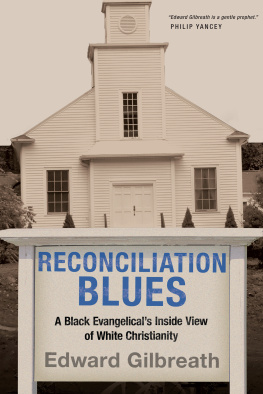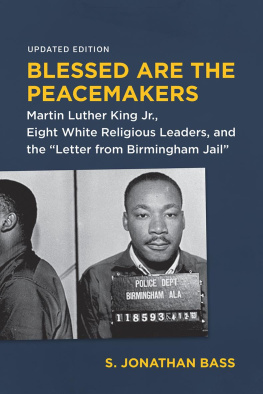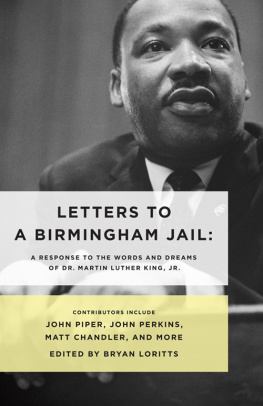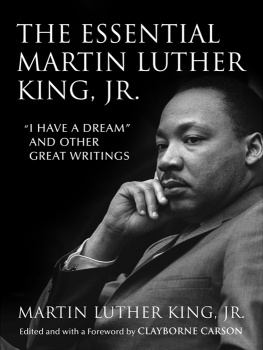Remembering Birmingham
Dr. Martin Luther King Jr.s Letter to America 50 Years Later
Edward Gilbreath
Adapted and expanded from Birmingham Revolution, forthcoming December 2013

For more information, click here.
www.IVPress.com/books
InterVarsity Press P.O. Box 1400, Downers Grove, IL 60515-1426 World Wide Web:
2013 by Edward Gilbreath
All rights reserved. No part of this book may be reproduced in any form without written permission from InterVarsity Press.
InterVarsity Press is the book-publishing division of InterVarsity Christian Fellowship/USA, a movement of students and faculty active on campus at hundreds of universities, colleges and schools of nursing in the United States of America, and a member movement of the International Fellowship of Evangelical Students. For information about local and regional activities, write Public Relations Dept., InterVarsity Christian Fellowship/USA, 6400 Schroeder Rd., P.O. Box 7895, Madison, WI 53707-7895, or visit the IVCF website at www.intervarsity.org.
All Scripture quotations, unless otherwise indicated, are taken from THE HOLY BIBLE, NEW INTERNATIONAL VERSION, NIV Copyright 1973, 1978, 1984, 2011 by Biblica, Inc. Used by permission. All rights reserved worldwide.
While all stories in this book are true, some names and identifying information in this book have been changed to protect the privacy of the individuals involved.
Design: Cindy Kiple
Images: Martin Luther King Jr: The Granger Collection, NYC/ All rights reserved.
signature: Wikipedia
ISBN 978-0-8308-6663-2
To all the men, women and children who, in 1963, put their lives on the line so that we could be a better nation today.
Introduction
MLK and the Elephant
A s an African American growing up in the Midwest in the 1970s, I always viewed Dr. Martin Luther King Jr. as a fantastical sort of figurean American folk hero who could give a good speech. On the Cool Black Heroes Index, he fell somewhere between John Henry and Muhammad Ali. Then I went to high school in the 1980s and learned more about the stuff that came before and after his signature I Have a Dream momentthe buses and bombs, police dogs and fire hoses. In time, King became a bit more real to me, like a dead poet or pioneering inventor. Then, in the 1990s, I attended a Christian college and went on to work at an evangelical publishing company. I discovered that racial tension and division were still alive and well in American Christendom. Suddenly, King became a prophet.
When Martin Luther King Jr. arrived on the national scene in the late 1950s, America was at a point somewhat similar to where we are today with regard to race. There had been significant political breakthroughs that signaled racial progressit was Brown v. the Board of Education then, and the election of President Barack Obama today. However, the reality on the ground is a completely different story. People of color still risk offending white people now as they did then if they dare to broach the subject of race.
There are big differences, of course. Back in the day, Negroes were simply expected to know their place in society as the inferior race and to accept it. Today the feeling among many white Americans is that people of color, particularly African Americans, should be satisfied with the tremendous advances in race relations since the civil rights period and that to bring up perceived inequalities is to expose yourself as either a whiner or a race-baiter.
Race as both a social construct and visible reality is the gigantic elephant in the American living room that some insist will disappear if we would just ignore it. For African Americans and other people of color, however, it is difficult to ignore a six-ton pachyderm when its sitting on top of you.
Part of the genius of Martin Luther King Jr. was his ability to interpret Americas racial crisis and provide a nation now firmly rooted in the television age with vivid illustrations of what racial injustice and mans inhumanity to man looked like. But he didnt stop there. He also supplied a hopeful picture of where we could go, a sort of travel brochure for what he called the beloved communityan integrated America that values justice, reconciliation and peace.
In Kings brief but storied career, the year 1963 was pivotal. After rocketing to notoriety following the Montgomery, Alabama, bus boycott in 1955, the young Baptist preacher led the founding of the Southern Christian Leadership Conference. The SCLC took Kings Christian-based vision of nonviolent resistance in the struggle for the civil rights of African Americans to the national stage. By 1962, however, he suffered a major setback with a faltering demonstration in Albany, Georgia, that was rendered toothless by a cunning police chief who refused to counter Kings nonviolence with physical force. The campaign flamed out dramatically, dealing a painful blow to the SCLCs momentum and Kings reputation. However, the summer of 1963 saw the civil rights leader regain his groove by leading the triumphant March on Washington, D.C., and preaching a Baptist sermon that would become arguably the most important political speech in American history.
But I Have a Dream and the March on Washington may not have been possible without the epic events on the streets of Birmingham, Alabama, that came four months before. After a slow start, the Birmingham campaign not only put the evil absurdity of Southern racism and segregation on national display, it also gave naissance to Kings Letter from Birmingham Jail, a document that rivals I Have a Dream in eloquence but, I would argue, surpasses it in both spiritual and intellectual perspicacity. It is a piece of writing that captures King at the height of his rhetorical powers, alternately angry, pastoral and prophetic, a man on a single-minded mission to neutralize the arguments of anyone who would suggest that the benefits of justice and citizenship could be postponed or decelerated for the Negro until a more convenient time. Kings Letter is a modern epistle that challenges us as Christians, as Americans, as human beings to bravely live out the obligations of justice, discipleship and love.
From time to time, prophetic Christian voices rise in timbre to challenge our nations original sin. Martin Luther King Jr.s voice and historic efforts as the Moses of Americas civil rights movement stands out as perhaps the most significant instance of a modern Christian leader acting in a prophetic role to instigate social change.
This year marks the fiftieth anniversary of both I Have a Dream and Letter from Birmingham Jail. Amid what will no doubt be a slew of articles, TV specials and other media products commemorating the landmark events of 1963, this little book is offered as a modest tribute to Martin Luther King Jr.s life, but especially to the events surrounding the writing of his masterful Letter from Birmingham Jaila work of literature and polemics that still stirs our mind and pierces our soul five decades later.








